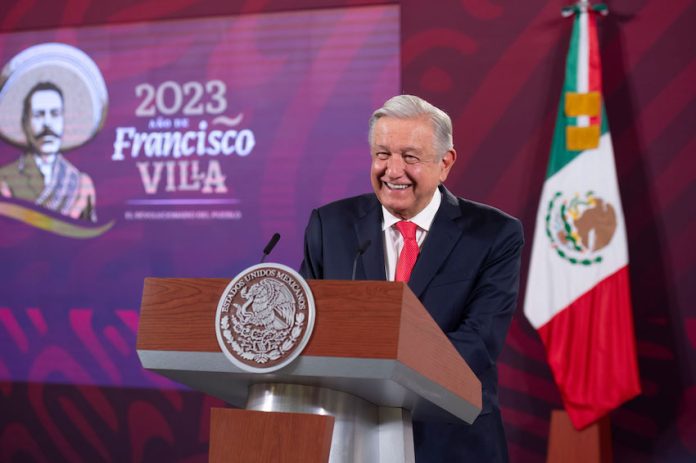With Semana Santa, or Holy Week, upon us, President López Obrador held just three morning press conferences this week instead of the usual five.
He announced at his Wednesday mañanera that he would spend the following days at his ranch in Palenque, but remain “attentive” to national affairs.
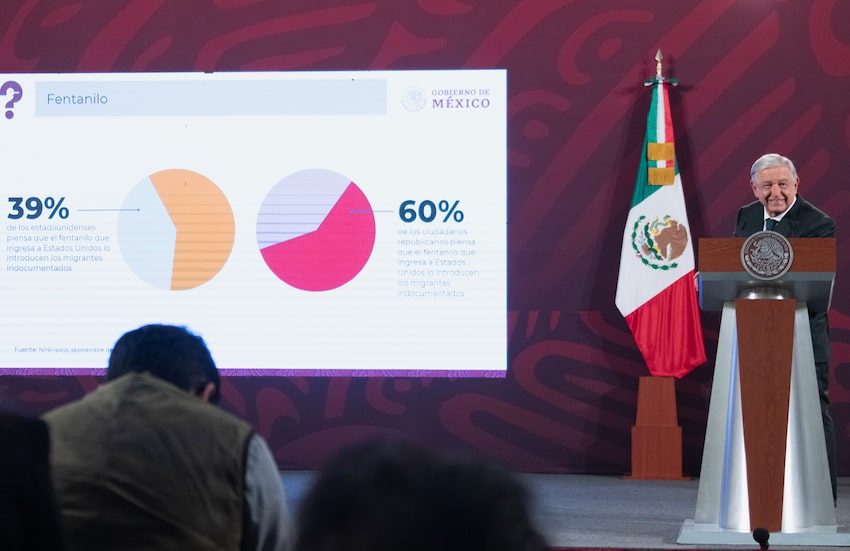
AMLO plans to spend a lot more time at his property in Chiapas once he leaves office in September 2024. He said in late 2021 he would retire there, turn off his phone and settle in to write a book on “conservative thought,” one of his pet hates.
Monday
In a preamble to the weekly update on fuel and food prices, López Obrador noted that his government took the “unorthodox” decision early in its six-year term to subsidize gasoline.
“The experts, the orthodox economists, don’t recommend that,” he said.
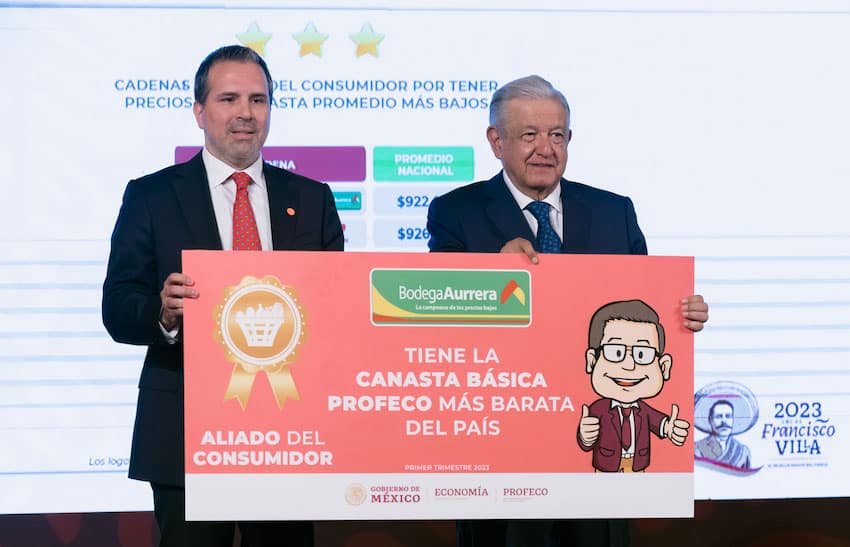
“What have we achieved? Well, we have very low inflation for energy, and that helps us to contain inflation in general,” AMLO said.
The head of the consumer protection agency Profeco subsequently reported that the average price for a liter of regular gasoline last week was just over 22 pesos.
“The three priciest brands were Oxxo Gas, Petro Seven and Akron. … Petro Seven and Akron hadn’t been in these first three places, but now they appear. Hopefully, they’ll adjust their internal policies,” Ricardo Sheffield said.
He said that the three cheapest gas stations last week, and therefore “the allies of consumers,” were Rendichicas, Exxon Mobil and Orsan.
The Profeco chief also said that Bodega Aurrera was the cheapest supermarket in the first quarter of the year for the 24 essential products that make up the canasta básica, or basic basket of goods.
The director of the National Tourism Promotion Fund later reported that tracks along just under half of the 159-kilometer-long section of the Maya Train railroad between Calkiní, Campeche, and Izamal, Yucatán, have been laid.
“In this part of the train route, passengers will be able to get to know and admire emblematic places like the Dzibilchaltún archaeological zone, Izamal, the port of Progreso and the city of Mérida with its rich cultural life,” Javier May said.
Federal Electricity Commission chief Manuel Bartlett gave an update on more than 50 electrical projects along what will be a 1,554-kilometer railroad, and declared that the construction of the Maya Train is one of the most significant infrastructure undertakings in Mexican history.
“The Maya Train will mean development for the south-southeast,” he added.
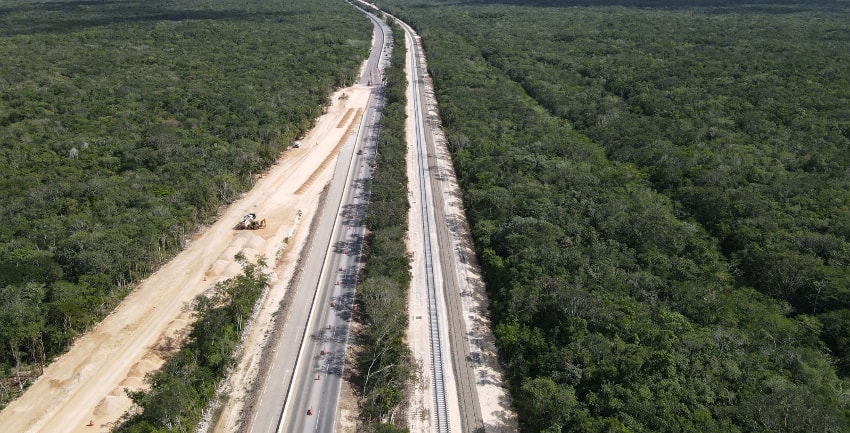
With AMLO back behind the mañanera lectern, one reporter questioned the government’s commitment to combating corruption given that no “big fish” have been arrested in an embezzlement case involving the Segalmex food security agency.
“There is no impunity,” López Obrador retorted.
“It’s just that you, the representatives of the conservative and corrupt press that is against us, are using these cases to try to project the idea that we’re the same [as past governments],” he said.
“… Firstly, we don’t tolerate corruption, or to say it more clearly, we’re not corrupt, we’re not thieves like previous governments, during which corruption with … the complicity of the media reigned. In the case of Segalmex, there are already arrest warrants issued and there are already people detained,” López Obrador said.
“And we’re going to explain — next week maybe — how the fraud occurred and how much [money] has been recovered because you’re taking about 15 billion pesos.”
Turning his attention to the March 27 fire in Ciudad Juárez that claimed the lives of 40 migrants, López Obrador acknowledged that security guards from a private company were working at the National Immigration Institute detention center where the blaze occurred despite his instruction that only government officials provide security at such facilities.
The president said that the government doesn’t yet have enough of its own security personnel to completely replace guards employed by private companies, two of whom were formally accused of homicide in light of video footage showing that migrants were left in a locked section of the detention center while the fire raged.
“I suppose that’s why they entered into that contract,” he said in reference to an agreement with a security company owned by an honorary consul of the government of Nicaragua.
Tuesday
During a security update, National Defense Minister Luis Cresencio Sandoval said that members of the National Guard (GN) will be out in force this Holy Week in the popular tourist destinations of Mazatlán, Puerto Vallarta, Acapulco, Cancún, Tulum and Veracruz.
A total of 4,824 GN troops will be deployed across the six destinations, while 3,800 more will patrol highways, he said. Sandoval said that GN members will also be on the ground in 14 airports across the country and 42 bus stations.
In the recurring “Zero Impunity” report, Deputy Security Minister Ricardo Mejía said that 16,722 presumed criminals were arrested in the period between March 22 and April 3.
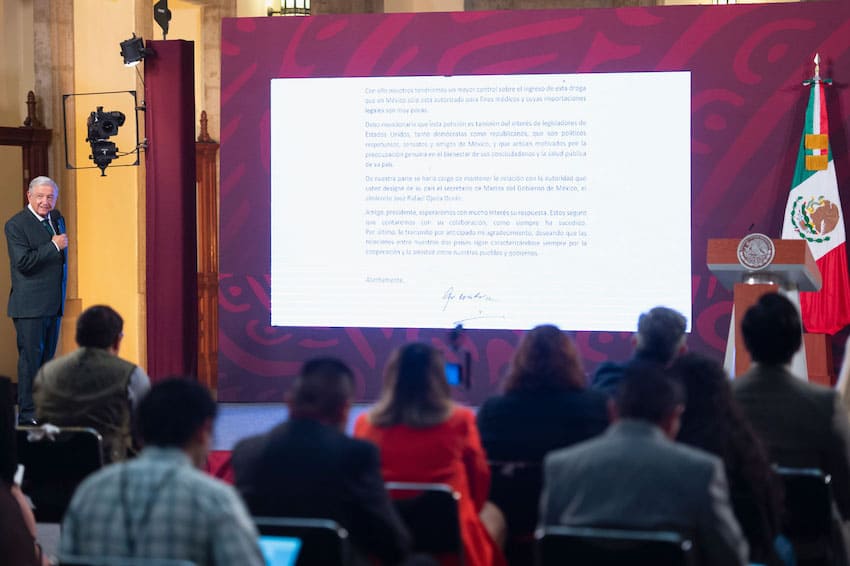
Among those he mentioned was an alleged pollero, or people smuggler, who was taken into custody in Nuevo León and seven presumed members of the Jalisco New Generation Cartel (CJNG) — including one nicknamed “el Bonito” (The Pretty One) — who were arrested in Colima.
Foreign Affairs Minister Marcelo Ebrard later offered a brief history of fentanyl, noting that the drug was first synthesized by the “great” Belgian scientist Paul Janssen over 60 years ago and approved as an analgesic by the United States Food and Drug Administration in 1968.
He declared that Mexico’s efforts to combat illicit fentanyl today “are the most significant in the world” and conveyed a blunt message to U.S. Senator Lindsey Graham, who claims that Mexico isn’t doing enough to stop the flow of the drug across its northern border.
“Mexico is not the problem. Rather … it’s the main part of the solution to the [fentanyl] problem. … The senator says that we, the Mexicans, are not just the origin of the problem [via the production of fentanyl] but that we’re the ones who traffic … fentanyl. But according to United States statistics, … 86.3% of the people in prison for fentanyl trafficking are United States citizens,” Ebrard said.
López Obrador subsequently revealed that he had written to Chinese President Xi Jinping to seek his support in the fight against the synthetic opioid.
Any information China can provide about who fentanyl is being sent to, the quantities being shipped, the vessels used to transport the drug and when and where shipments will arrive in Mexico would be “invaluable,” the president said in his letter, which he read aloud to reporters.
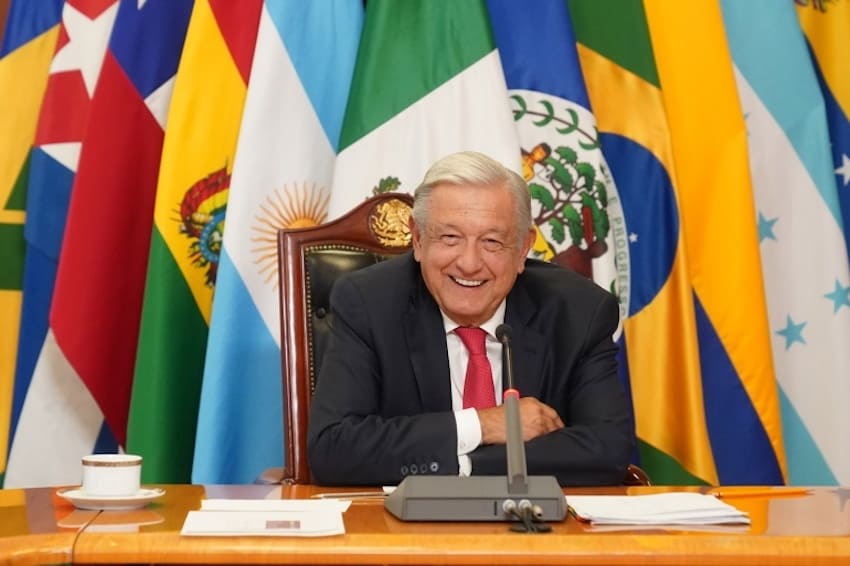
Holding forth on disparate political ideologies during his subsequent Q&A session with reporters, AMLO asserted that the “sole doctrine” of the “conservative right” is “hypocrisy” and that members of such parties and groups are not supporters of democracy but rather defenders of oligarchy.
“… Democracy is government of the people and it annoys [conservatives] greatly when the government is of the people and for the people, when … everyone is listened to and everyone is respected but preference is given to the poor. That really irritates them because they’re very classist and racist,” he said.
At the conclusion of his presser, López Obrador noted he would meet virtually on Wednesday with a group of leftist leaders from Latin American and Caribbean countries, including Luiz Inácio Lula da Silva of Brazil, Gabriel Boric of Chile, Alberto Fernández of Argentina and Miguel Díaz-Canel of Cuba.
“There are 10 of us. We’re basically going to take about how to exchange foodstuffs – the trade of food, of raw materials, to confront together the problem of inflation. … That’s the basic issue,” he said.
Wednesday
In a continuation of her purported myth-busting work, government media monitor Ana García Vilchis took center stage early in the press conference to present another edition of her “Who’s Who in the Lies of the Week” segment.
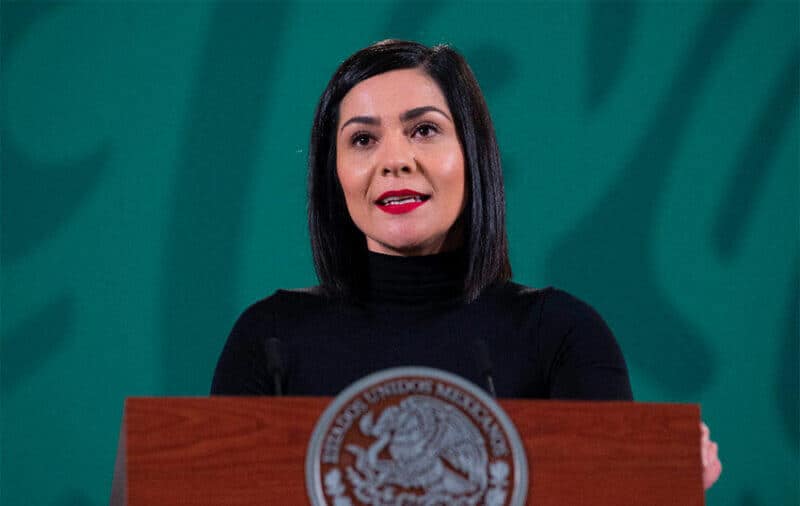
“According to opposition media outlets and journalists, … the President Andrés Manuelovich is receiving help from Moscow to confront the fuel prices crisis,” she said, using a nickname AMLO invented for himself during the 2018 presidential election campaign.
“But all that turned out to be a fairy tale,” García said.
Reports that a Russian ship carrying diesel had arrived in Guaymas, Sonora, were false, she said, explaining that the vessel in question had set off from Russia but was in fact sailing under the Cyprus flag and carrying 25,000 tonnes of fertilizer “that will be distributed to farmers across the country.”
García also took aim at a “veritable disinformation campaign” that claimed that AMLO suffered a heart attack last week.
“There are professional liars and slanderers … that repeat these kinds of attacks against the government, against officials and especially against President López Obrador every day,” she said.
Apparently in good health, AMLO strode back to his lectern as reporters vied to be selected as his first inquisitor of the day. The victor asked the president about the agreement the government reached with the Spanish energy company Iberdrola to buy 13 of its power plants in Mexico for approximately US $6 billion.
“I believe the agreement signed yesterday is very important for the country … especially consumers, because in essence what it guarantees is that the price of electricity won’t go up. That’s the essential thing,” López Obrador said.
“There are a lot of technical elements, but to those watching us, listening to us, I say that we’re making this purchase to strengthen the public company – the Federal Electricity Commission, in order to be in a position to offer electricity at fair prices,” AMLO said.
“I made a commitment that prices for fuel, electricity, gas, gasoline and diesel wouldn’t increase and I’m fulfilling it. In more than four years, there haven’t been increases and I can prove it,” he said.
After spending almost an hour discussing the Iberdrola deal, the government’s (controversial) energy policies and the history of the energy sector in Mexico, López Obrador addressed his recent decision to veto the appointment of two National Transparency Institute commissioners.
The ruling Morena party and the National Action Party reached an agreement to select one commissioner each, but the two people chosen weren’t the best candidates, he said.
“I did an investigation and I found that … they hadn’t even passed the exam, or they weren’t in the first places so we said no,” AMLO said before defending last month’s lottery to elect four new National Electoral Institute (INE) councilors, including the agency’s president.
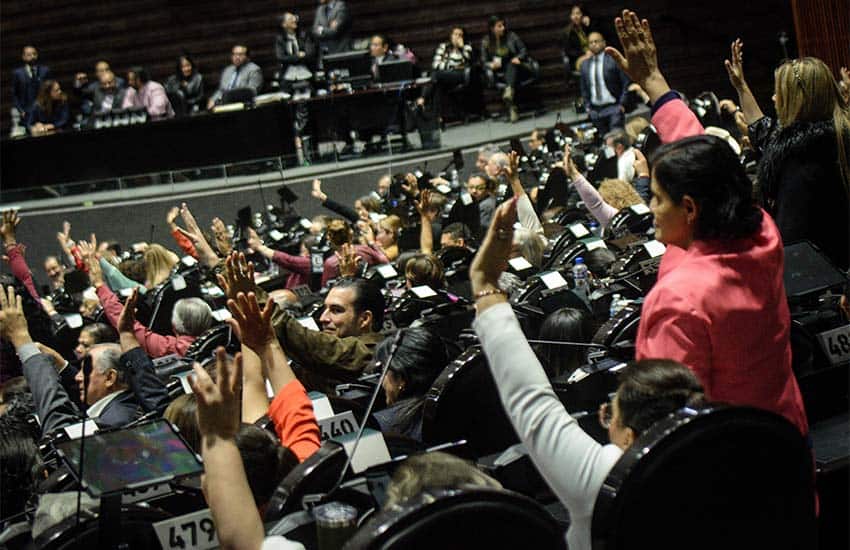
“In the case of the INE there were 20 [candidates] and there was a draw and four [names] came out. That’s democratic,” he said.
Before calling an end to his third and final presser of the week, AMLO described data showing that inflation declined to 6.85% in March as “very good” and briefly weighed in on the legal troubles faced by former United States president Donald Trump.
“Now I’m going to give you a story,” he told reporters.
“I reiterate, I maintain my position that … supposedly legal issues should not be used for political-electoral purposes. That’s why I don’t agree with what they’re doing to the ex-president Trump. I don’t agree, I already suffered from that myself,” López Obrador said, referring once again to an accusation related to a property expropriation that he faced while mayor of Mexico City in the early 2000s.
Mexico News Daily
